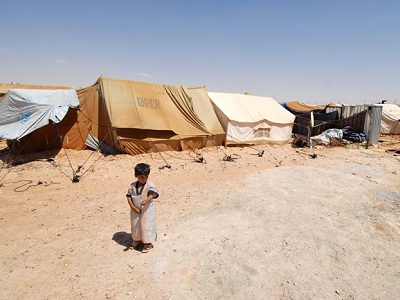
By Ali Huwaidi
The last thing one would think of is that the reduction of services provided by an agency established by the UN would constitute a violation of the Universal Declaration of Human Rights, all 30 articles of which were adopted by the organisation on 10 December, 1948. Indeed, no one would have thought that the violation would take place before the eyes and ears of the same countries that adopted magical terms such as democracy, partnership, participation, freedom of speech and opinion, equality, respect for human rights, and non-discrimination regardless of race, gender or belief.
UN General Assembly Resolution 302, which was approved by 51 countries, is basically the founding document of the UN Relief and Works Agency for Palestine Refugees in the Near East (UNRWA), created on 8 December, 1949. These same 51 countries ratified the Universal Declaration of Human Rights, and today 193 countries have adopted it. This means that those who signed this international declaration in 1948 also adopted the establishment of the humanitarian and political agency.
However, in practice, the second paragraph of Article 13 of the Declaration, which stipulates that “everyone has the right to leave any country, including his own, and to return to his country”, has not been followed with regards to the Palestinian refugees who were driven or fled from their country upon the foundation of the state of Israel in 1948. Neither Israel nor the international community have ensured that the right of return has been applied, despite the fact that the decision to establish UNRWA is based on the fifth and twentieth paragraph of UN Resolution 194 adopted by the General Assembly on 11 December, 1948, which reinforces Article 13 (and the right to return) as well as the right to compensation and restitution.
Over the past six decades, UNRWA has been subject to more than one financial setback as a result of the donor countries’ failure to fulfil their commitments; the agency is funded entirely by voluntary donations. This has led to a reduction in the services provided by UNRWA which is affecting Palestinian refugees in the health, education and humanitarian relief sectors. However, matters have never reached the stage of threatening to end one of its programmes if the donor countries do not cover the financial deficit and commit to continue to provide services. That, however, is what has now happened with the agency’s education provision. There have also been threats to stop the health programme, which was announced explicitly by UNRWA spokesman Sami Mushasha on 26 July. He stated that the agency only has enough funds to continue the health programme until the end of 2015, meaning that unless the required funds are secured, it is also at risk of being stopped. This dangerous and unusual situation began with the press conference held by the UNRWA Commissioner-General Pierre Krähenbühl on 14 May, in which he stated that the agency is on the verge of extreme austerity due to the budget deficit.
Stopping the education and health programmes would be flagrant violations of Article 25 of the Universal Declaration of Human Rights, which states that “everyone has the right to a standard of living adequate for the health and well-being of himself and of his family, including food, clothing, housing and medical care and necessary social services, and the right to security in the event of unemployment, sickness, disability, widowhood, old age or other lack of livelihood in circumstances beyond his control.” In addition, Article 26 of the Declaration states that “everyone has the right to education. Education shall be free, at least in the elementary and fundamental stages. Elementary education shall be compulsory. Technical and professional education shall be made generally available and higher education shall be equally accessible to all on the basis of merit.”
If UNRWA makes an official decision to end the education programme, which may be hinted at during the first half of August, it would mean that 479,519 primary and secondary level students will be deprived of their right to be educated, along with thousands of students studying at vocational training centres. In addition, 22,646 individuals will lose their jobs and nearly 700 schools will be shut down as well as nine VTCs. This means that 55 per cent of the agency’s total budget will be scratched.
If the donor countries are unable to fulfil their financial obligations for one reason or another, it is the duty of the UN to uphold the foundations and principles on which it was founded and to cover the deficit from its central fund. It must also take immediate action to save its reputation, or whatever is left of it given that it appears to give priority to political interests at the expense of international justice and human rights.
(This article was first published in Middle East Monitor)





